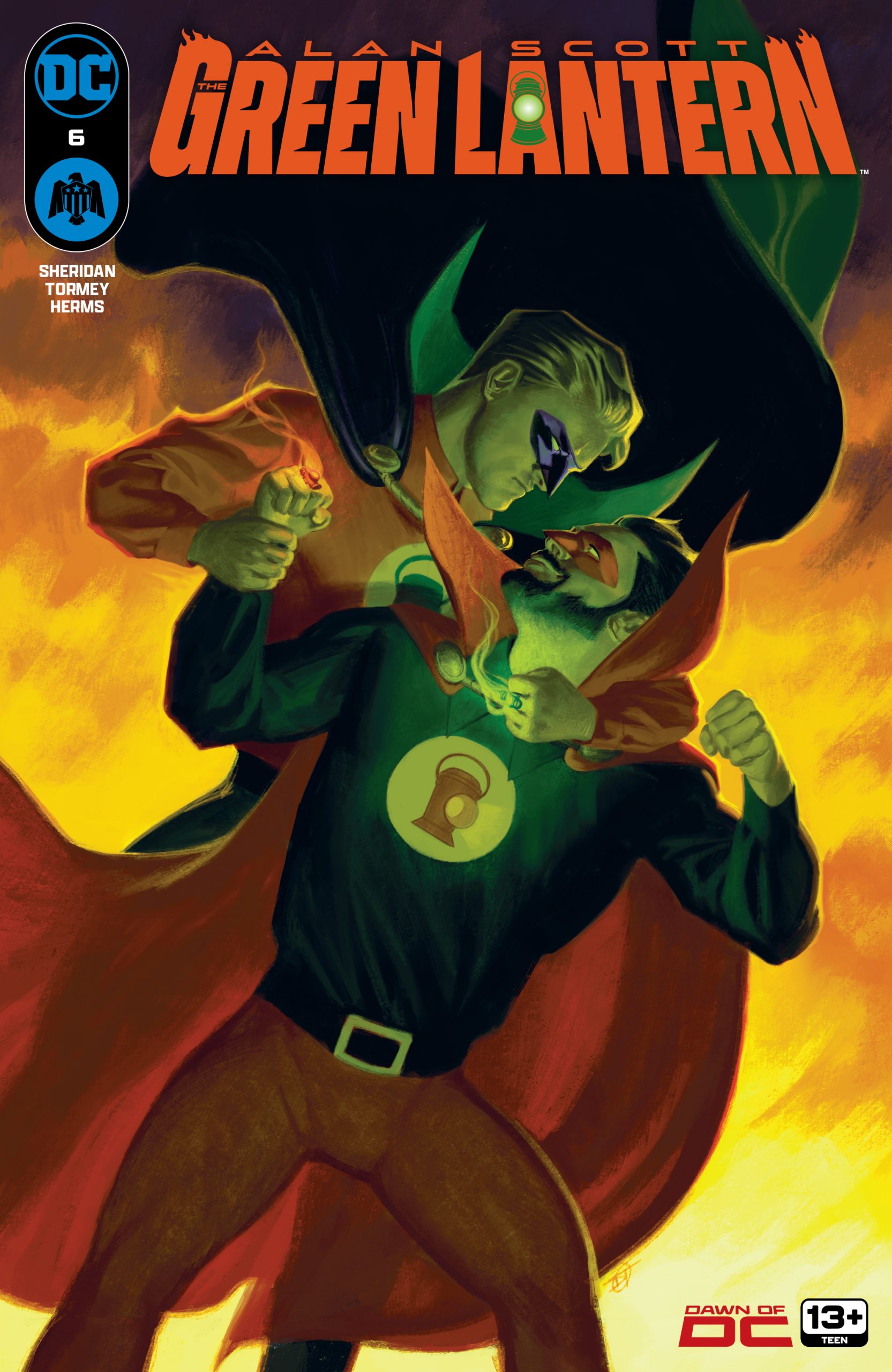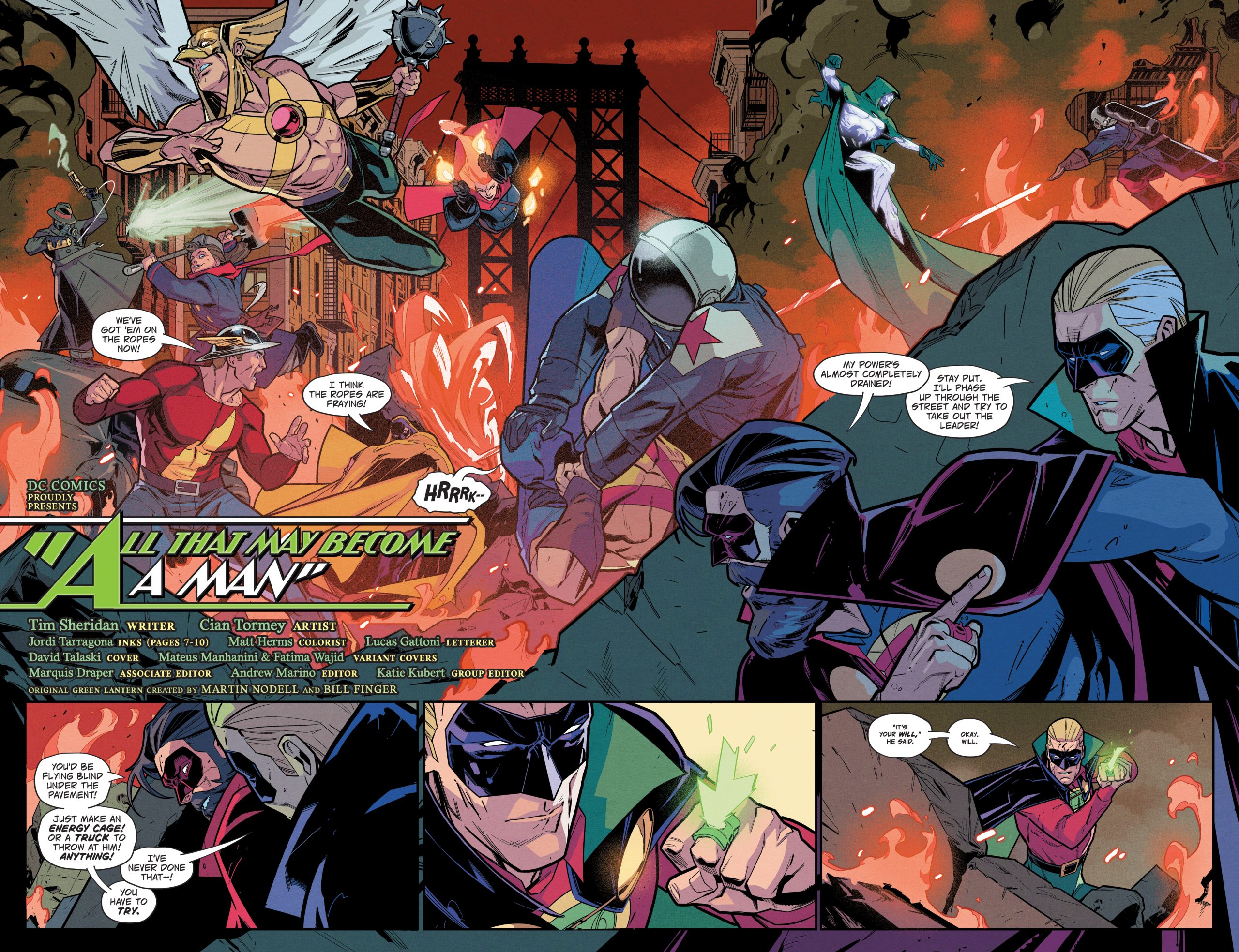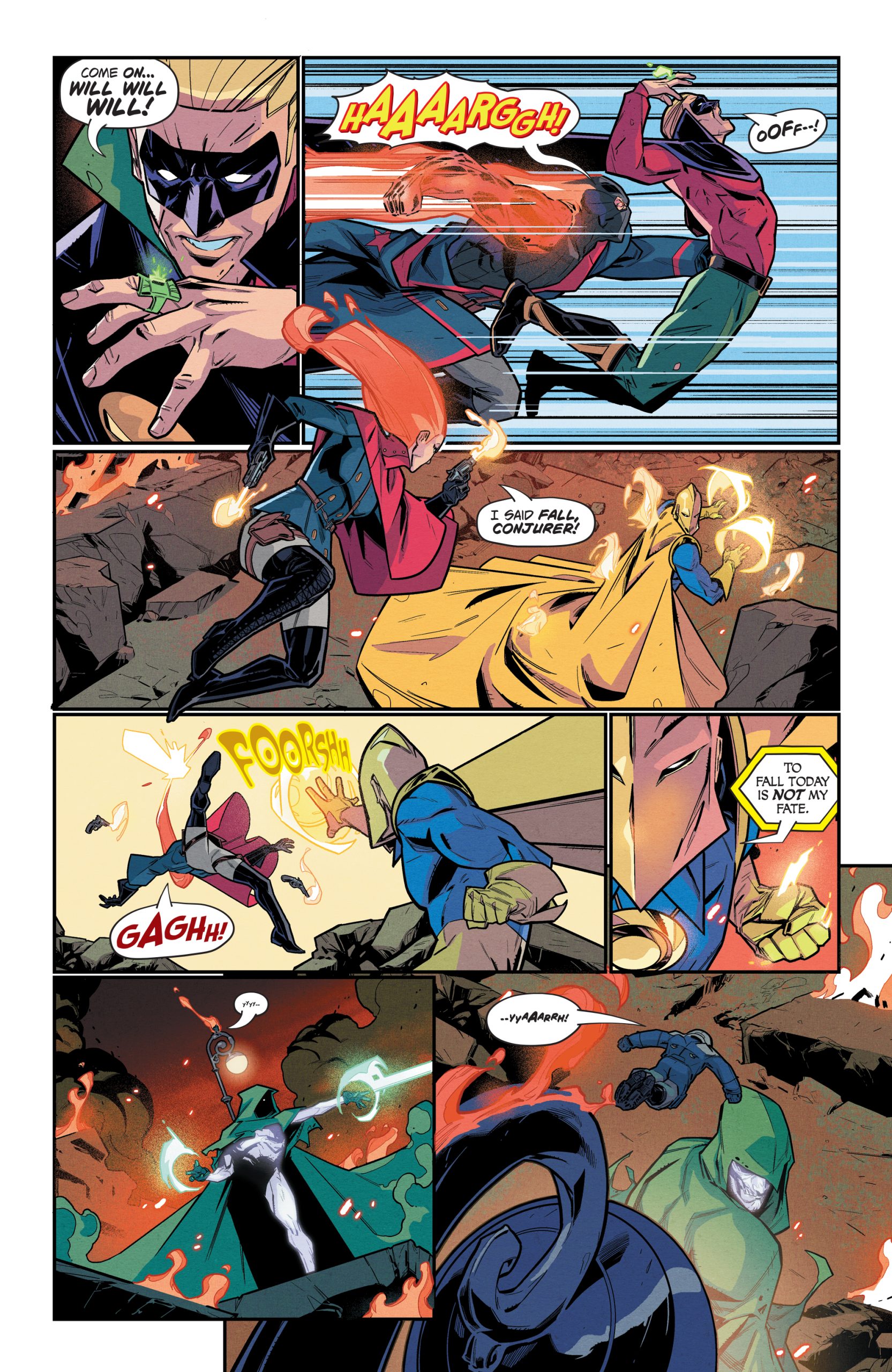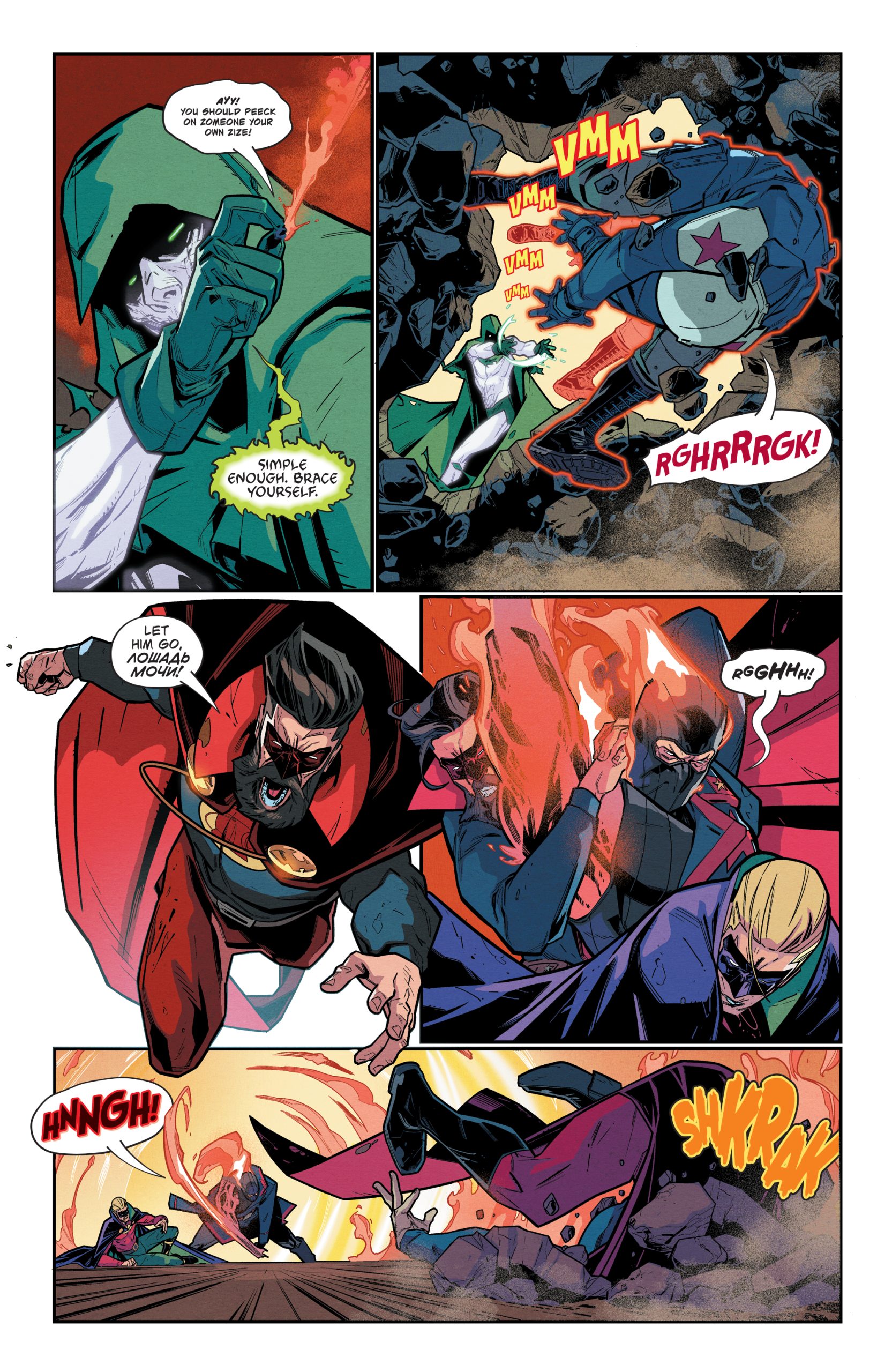Review: Alan Scott: The Green Lantern #6
 [Editor’s Note: This review may contain spoilers]
[Editor’s Note: This review may contain spoilers]
Writer: Tim Sheridan
Art: Cian Tormey with Jordi Tarragona
Colors: Matt Herms
Letters: Lucas Gattoni
Reviewed by: Matthew B. Lloyd
Summary
With the help of the Justice Society of America, Alan Scott, the Green Lantern defeats his lover and nemesis, the Red Lantern. But, does he really believe Red Lantern is the villain?
Positives
There’s a theme that Sheridan develops in this series that he brings around for this conclusion in Alan Scott: The Green Lantern #6. The importance of Alan being gay is a believable through line for the series. From a storytelling perspective it’s solid. It works in the sense that the purpose of the series was to tell Alan Scott’s story since being retconned to being a member of the LGBTQ community. Sheridan effectively demonstrates this in the conclusion as the plot points strewn about in the first five issues do in fact come together.
Cian Tormey’ art is effective and does its job. There are some nice moments as he has a wide array of emotions to communicate throughout the ups and downs of this final issue. Also, we finally get an appearance of Obsidian which confirms he and his sister, Jade are still part of continuity.

Negatives
The single biggest negative about this series and its culmination in Alan Scott: The Green Lantern #6, is how it devalues Alan Scott as the first Green Lantern. Alan faces off with Johnny Ladd/ Vladimir Sokov/ Red Lantern who turns out to be more experienced, more effective and more knowledgeable about how to use will power to manipulate the Lantern flame. He understands the Green and Red flames are related and he teaches Alan how to use will power to make the power in Alan’s ring do what he wants it to do. For a series that should be all about how important Alan is, this aspect of the story does the exact opposite. Alan may be the first Green Lantern, but the story that Sheridan gives us makes Alan second fiddle to Johnny/ Vlad. It certainly comes across that Alan couldn’t have become a powerful, effective and iconic hero without Johnny/ Vlad’s instruction. This actually lessens Alan’s importance of being the first, because now he really isn’t the first. It also calls into question Alan’s willpower.

Sheridan also adds aspects to Alan’s past that detract from what should be a heroic characterization. In issue #3 we see Alan visit prostitutes. In issue #1 we learn he had to be blackmailed into joining the Justice Society of America. He’s also blackmailed into sex acts with J. Edgar Hoover. While these may fit the narrative of a gay man in the 1940’s, they don’t fit the idea of an iconic DC Comics hero or a character known for willpower. In this sense, Sheridan is more interested in writing a gay character as opposed to Alan Scott who’s existed for over 80 years and who’s never demonstrated these character traits.
Negatives Cont’d
Additionally, his love for Johnny/ Vlad seems to blind Alan to Vlad’s crimes, he even tells Vlad this as he suggests to Vlad how he can escape from the American authorities. This is a very strange and troubling turn. It also calls into his willpower. Is he really unable to use that willpower to overcome his emotions and see Vlad/ Johnny for who he really is and that he’s held for his crimes?

Sheridan presents the idea that Alan’s willpower comes from his strength of being a gay man. It seems that only by having to face the struggles of being a gay man in the ‘40’s was he able to develop his willpower. As stated above, however, the importance of this willpower comes from Johnny/ Vlad. This also indicates that without Johnny/ Vlad he wouldn’t have had the willpower to be able to get up every day and live his life. He calls out Hoover who he knows hides the same secret:
“As if you Mr. Hoover, don’t know what it takes to live a secret life. The exhausting amount of energy, of willpower to wake up every day, put on the suit, and quietly go to work for a world, that if they knew who you woke up next to would turn its back or worse- wait till you turn yours and pull the trigger.”
He tells off Hoover and is able to free himself from the threat of blackmail. The story demonstrates that it’s all due to Johnny/ Vlad instead of anything intrinsic in his own character. We see that he doesn’t even know that willpower controls the power in the ring.
Negatives Cont’d
In the first five issues, Tim Sheridan goes to great lengths to show the reader what life for a gay man in the 1940’s is like. A lot of these moments are sobering and effective. Along the way, it’s not hard to see Alan as a different iteration of the Golden Age Green Lantern. It’s easy to imagine that this Alan wouldn’t marry Rose Canton and have kids with her. It’s easy to imagine that he wouldn’t marry Molly Mayne in their twilight years. Alan isn’t questioning. We’ve seen, in no uncertain terms, this series has shown not only is Alan gay, but he KNOWS he gay. He’s accepted himself, it’s not an easy life but he knows what it takes to live this secret life. Unfortunately, at the end of Alan Scott: The Green Lantern #6, Sheridan pivots and drops the ball by trying to fit in Alan’s relationships with women. It comes off as editorial interference and something that wasn’t part of Sheridan’s plan for the character. This series would’ve been much stronger had Sheridan not connected the dots and Alan’s past no longer included Rose, Molly and his children. It would’ve served the story AND character MUCH better.

This is potentially the most compelling aspect of Alan’s new history, especially considering the strength with which Sheridan has developed the importance of Alan being gay. Sheridan throws Rose and Molly in almost as an afterthought. It appears to only be there because it has to be. Ultimately, it isn’t explained satisfactorily and it actually calls into more questions about Alan’s character.
Despite all we’ve seen in the first five issues and parts of #6 that all that reinforcement of Alan sexuality…he still likes women? Despite reinforcement of the importance of Alan’s willpower he still has relationships with women…KNOWING he’s gay? Wasn’t the point of this series to show Alan’s recontextualized history as a gay man?
This means that Alan has misrepresented himself and lied to these women. This is a huge problem for his characterization. It doesn’t fit the actions of a hero, nor does it reflect the abilities of someone who relies on willpower to accomplish his super-heroing. It leaves him a mess.
Finally, there’s a bizarre time travel bit in which Alan leaves a letter for himself to read that he’s written in the future. It adds nothing to the issue or the series and comes off as a reminder for Sheridan himself that he’s loved. The content of the letter does something truly strange as it reinforces the importance of the love of his biological children, something completely incongruous with a man living a gay lifestyle. It’s not clear what should be taken from this. It further muddles the waters…is he saying, even though you know you’re gay you’ve got to trick a woman into having your children? The more I think about it the worse it gets.
Verdict
Alan Scott: The Green Lantern #6, like the entire series, is uneven. There are moments that really work and are quite compelling, but it all seems to be in service to retconning Alan’s sexuality as opposed to be in service of Alan as a heroic character. Sheridan tries to get the reader there, but the end is just unsatisfying in almost every way. If he’s supposed to be bi-sexual that’s a different story…. If he’s a gay man with a strong will power to live his life as he is then why would he lie and misrepresent himself to women? It’s not heroic, it’s not…nice…. It highlights how forced changing Alan’s sexuality is. It feels like DC wants to have its cake and eat it too. The character ends up being weaker for it.
